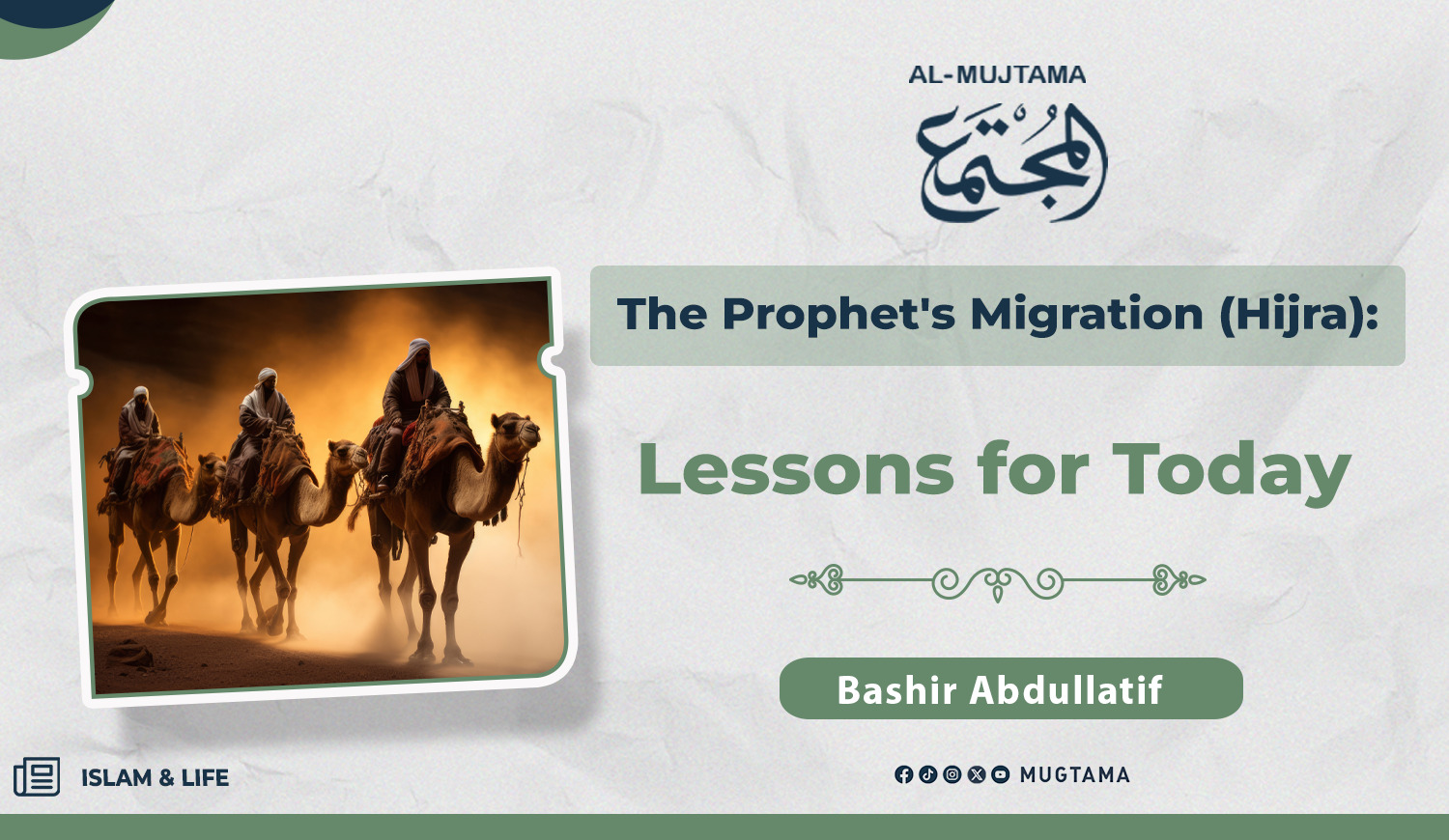Great Beginnings in the Shadow of Gaza's Painful Reality
The Prophet's Migration (Hijra): Lessons for Today

Every year, the memory of the blessed Prophet's Migration (Hijra) returns to renew within the nation the spirit of patience, determination, and trust in Allah's victory. It wasn't merely a move from Mecca to Medina; it was a turning point in the course of the Islamic call (Da'wah) and a station brimming with lessons our nation needs at every stage of tribulation. This is especially true for our steadfast people in Gaza, who are enduring a recurring catastrophe, living under siege, displacement, and killing – circumstances similar to what the Prophet Muhammad (peace be upon him) and his companions faced in Mecca before the Hijra.
A Station of Victory After Suffering
The Prophet (peace be upon him) and his companions faced
severe persecution in Mecca. Some were killed, others imprisoned, and they were
forcibly expelled from their homes. The Prophet (peace be upon him) said as he
left Mecca, "By Allah, you are the most
beloved land to me, and were it not that your people expelled me from you, I
would not have left." (Narrated by Al-Tirmidhi).
Similarly, in Gaza, how much love do its people hold for their
land, despite the destruction and ruin that has befallen it! How many mothers
have bid farewell to their children! How many children have seen their homes
demolished over their heads! It's as if history is repeating itself, but in a
resistant Palestinian guise.
From Mecca to Gaza: Unity in
Tribulation and Steadfastness in Principle
In Mecca, Muslims were subjected to all forms of harm, yet
they did not abandon their religion or change their stances. Likewise, the
people of Gaza, despite their wounds, have not weakened or faltered. Instead,
they have remained steadfast in their principles, as Allah says: "So they did not weaken for what struck them in
the cause of Allah, nor did they give in, nor did they abase themselves. And
Allah loves the steadfast." (Quran, Al Imran: 146).
The Hijra was a necessity to preserve the faith, not an escape
from reality. Similarly, Gaza's steadfastness is not a losing gamble; it is
firmness on truth and waiting for the promised relief. Indeed, victory is but a
moment of patience.
Planning with Reliance: No
Contradiction
The Prophet's Hijra was not haphazard; it was meticulously
planned: choosing a companion (Abu Bakr), the appropriate timing (night), a
temporary hiding place (Cave of Thawr), and security cover (Abdullah ibn Abi
Bakr, and those who provided food from Abu Bakr's family). All these indicate
the combination of reliance on Allah and taking necessary measures.
This is what the nation must grasp today, especially in Gaza;
reliance on Allah does not mean surrender, but rather necessitates preparation,
as Allah says: "And prepare against them
whatever you are able of power." (Quran,
Al-Anfal: 60).
The people of Gaza plan; they dig tunnels, manufacture what
weapons they can, and face the siege with austerity and innovation. This is
precisely what the Prophet (peace be upon him) did on the day of the Hijra.
The Ansar: Lessons in Shelter and
Support
One of the greatest lessons of the Hijra is the stance of the
Ansar, who sheltered and supported the Muhajirun (emigrants) and
prioritized them over themselves, thus earning divine praise: "And those who settled in the home [of immigration]
and [embraced] the faith before them love those who emigrated to them." (Quran, Al-Hashr: 9).
Where are the Ansar of Gaza today? Who opens their doors to
them as they were open for Muhajirun? Who offers true support instead of
empty declarations?!
We need the Ansar of this era, not with words but with
actions; through support, shelter, and courageous political stands that break
the chains of the siege.
No Hijra After Conquest, But Jihad
and Intention
The Prophet (peace be upon him) said after the conquest of
Mecca: "There is no Hijra after the conquest,
but rather Jihad and intention." (Narrated by Al-Bukhari).
While this Hadith indicates that the land of Islam has been
established, it also opens a door to a profound understanding: even if the form
of Hijra has ended, its meaning remains in Jihad (struggle), in sincere
intention, and in steadfastness in religion.
Gaza today is the arena of Jihad and sincere intention.
Whoever cannot emigrate to it should emigrate with their intention, with their
stance, with their support, with their pen, by boycotting the enemy, and by
exposing their crimes.
The Hijra was the gateway to building the Islamic state and
the launch of the empowerment project, despite its painful beginnings. Today,
the people of Gaza, with their blood, are forging the dawn of the Ummah
(nation). Perhaps they see in the death of their children and their
catastrophes pains without hope, but Allah promises them – as He promised His
Prophet – a near victory: "Indeed, We will
support Our messengers and those who believe during the life of this world and
on the Day when the witnesses will stand." (Quran, Ghafir: 51).
Gaza: The Title of the Modern Hijra
Just as the Prophet (peace be upon him) migrated from
honorable Mecca, compelled and not by choice, so too are the people of Gaza
forcibly displaced today. However, they carry hearts that do not migrate,
consciences that do not depart, and souls connected to Al-Aqsa Mosque, which
was linked to the Prophet (peace be upon him) on the night of Isra (Night
Journey) before the Hijra, serving as spiritual preparation for the next stage.
Therefore, one of the greatest lessons of the Hijra is
not to despair, but to be optimistic. For after every Cave of Thawr, a Medina is waiting for us, and after every period of patience, there is victory and
empowerment.










